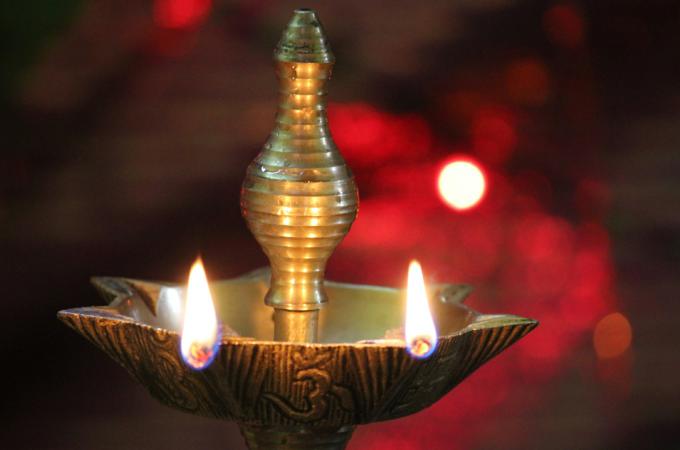Hindu-Catholic national dialogue on love of neighbor
''Respect for the dignity of the human person is the foundational principle. The crown of creation is the human person," said Archbishop Christophe Pierre, Vatican Ambassador to the United States at the Nov. 11 third national Hindu-Catholic dialogue meeting. "The human person bears the divine image and is made for communion -- union with God and with others. Dignity is not based on what the person has or does, but on what the person is," he said.
The meeting, which took place at the Shri Siva Vishnu Temple in Lanham, Maryland, began with a video communication to the dialogue participants from Congresswoman Tulsi Gabbard from Hawaii: "The more we grow in love of God, the more we will love our neighbors, and the less we will see war as the answer to our problems. We cannot cultivate our love for God independent of the well-being of others who are all God's children. What could be more pleasing to God than caring for God's children? This is the solution to all of our problems," said Gabbard.
In his keynote address on the theme of the gathering -- "Love of Neighbor in the Catholic and Hindu traditions: Reflections on War, Nationalism and Poverty" -- Archbishop Pierre stated that love is a choice for the good of others, the common good, and that this is the proper context for discussing nationalism.
He cited Pope Francis' statement in the past month that politics needs leadership that functions in a spirit of conciliarity and solidarity. While the Church is supportive of patriotism and cultures, she rejects nationalism. She proposes the culture of encounter.
"Before war can be engaged," said Archbishop Pierre, "all other means of seeking to resolve the conflicts must have been tried first. The weapons of truth and justice must be used. One is morally bound to confront others who commit genocide. This is a crime against God and humanity."
In her keynote address, Swamini Svatmavidyananda, a professor in Berkeley, California, and spiritual director for Hindu educational communities in Maryland and Oregon, said "The right to practice one's own faith does not include making it difficult for other faiths to practice theirs. Freedom of religion enjoins upon everyone the responsibility to respect, and never to denigrate or vilify, others' faith and practice."
"Everything for us Hindus is a manifestation of God," said Swamini. "The air we breathe, trees, clouds, all created beings are just manifestations of that one God. We do not worship idols or graven images; they are simply expressions of the One. And that Presence is not outside of who you are."
On the topic of war, Swamini noted that the Hindu tradition is committed to "ahimsa," non-violence. "Our whole life is governed by non-violence. If we had to pick out one value in all the values of Hinduism, it is non-violence. The Veda encourages its practice in all transactions. Using arms comes only at the very end when all other possibilities have been exhausted," she said.
"We have to engage in dialogue with traditions other than our own," Swamini reflected. "In the past, Christianity was used as a tool of colonialism in India and other parts of the world. We need a new covenant of relationship so that we go beyond this history and the pain of the past. We need to reset the button on new ways of interacting and respecting one another."
Swamini cited climate change as a domain of collaboration. "There is a lot that Pope Francis is doing to respond to climate change. This is something Hindus would be happy to engage with. We have a lot to explore in common, and we can work together to promote understanding and harmony among all religions."
Jesuit Father James Redington of the University of Scranton, Pennsylvania, one of the panel respondents to the keynote speakers, observed that solidarity is a real help for common action in overcoming poverty, making peace, helping refugees, offsetting climate change.
"If we act together in solidarity, that will deepen and make more effective our work. Good Christians should have the courage to tell other Christians who denounce Hinduism that they are demonizing a very good religion," said Redington. "Tolerance is necessary as a minimum. At a middle level is respect for religions other than our own. The highest level is friendship. Aspects of another's religion can enrich me and my own religion."
Another panel respondent, Anuttama Dasa, director of a Hindu international commission, shared that the Christian respect for the dignity of life expressed in church sponsored hospitals, soup kitchens, homeless shelters, and other charities challenges Hindus to ask: "Do we serve enough?"
"Catholics are so caring for unborn life," said Dasa. "Should we Hindus not become equally advocates on this issue? You challenge me to be deeper and more self-disciplined about my own faith. To not just study it, but to live it! We can both do better in word and deed, starting today."
- Father Thomas Ryan, CSP, directs the Paulist North American Office for Ecumenical and Interfaith Relations in Boston.



















